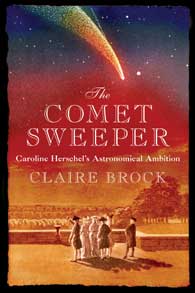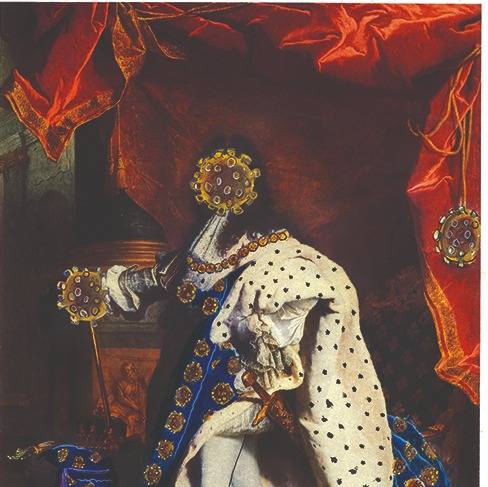How refreshing to read a book about a woman scientist whose achievements are not inflated to meet the demands of feminism. Not that the remarkable astronomer Caroline Herschel, born in Hanover, Germany in 1750, managed to escape being classified as assistant to her celebrated brother, Sir William Herschel, Astronomer Royal to King George III.
 In 1828 Caroline Herschel was awarded the new Royal Astronomical Society’s Gold Medal for her catalogue of stars and nebulae. Presenting it, James South dripped with patronisation: “we scarcely know whether most to admire the intellectual power of the brother, or the unconquerable industry of the sister.”
In 1828 Caroline Herschel was awarded the new Royal Astronomical Society’s Gold Medal for her catalogue of stars and nebulae. Presenting it, James South dripped with patronisation: “we scarcely know whether most to admire the intellectual power of the brother, or the unconquerable industry of the sister.”
“Industry” consisted of the activity known as “sweeping”. It was cold work: sitting through the night on a rooftop, in a hut or in a meadow, staring through a home-made telescope to observe and record minute changes in the pattern of the starry heavens. Caroline Herschel, however, was more than her brother’s sweeper. She became the first woman to discover a comet and the first to be elected a member of the Royal Astronomical Society, in 1836.
The Herschels, brother and sister, began their star-gazing in Bath, where William had come from Germany to work as a musician. Caroline accompanied him as his housekeeper – the one role for which her family had prepared her. Stunted by typhus, scarred from smallpox, she was seen as unlikely to marry and, as the spinster daughter, was expected to run the household – in Hanover, for her mother, and in England, for her brother. Even so, her father had taught her, as he had William and her other siblings, music and mathematics.
In Bath, under guidance from William, Caroline trained her voice and won acclaim as a singer, especially as premier soloist in Handel’s Messiah. She was good enough to be offered an independent singing engagement in Birmingham, but she refused. She would not sing where her brother was not the conductor.
For both Herschels, the transition from mathematics to music to astronomy seemed effortless. When William became obsessed by studying the skies, so did his sister. He enlisted her help, mainly in assisting him to make more and more powerful telescopes. He also allowed her to stuff food into his mouth when she realised that, after 16 hours at the telescope, he had forgotten to eat. His discovery of the planet Uranus in 1781 was their reward. Together they had constructed the large and powerful telescope that enabled him to do it.
His success impressed his fellow Hanoverian, George III, who called him to Windsor as Royal Astronomer (but at half the income he had enjoyed as a musician in Bath). William co-opted his sister to help him. In 1783 she had discovered three new nebulae and in 1786, without her brother’s aid, her first comet.
By 1797 she had discovered eight comets. But she did get paid – £50 a year – the first paid woman scientist. Less than she would have made copying music in Bath, she noted wrily.
It is an acknowledged fact that astronomy, like crystallography, suits and attracts women scientists in a way that other scientific fields, notably physics, do not. Is it that women are innately gifted at watching, waiting, recording? Whatever. Even in the late 18th century, their achievement was recognised. Caroline Herschel’s name appeared in British Public Characters of 1798 and a decade or so later, the director of the Paris Observatory, Joseph de Lalande, wrote a book Ladies’ Astronomy, praising the intellectual capacity of famous women in science from the fourth-century Hypathia of Alexandria to Caroline Herschel, whose work he greatly admired.
After William Herschel’s death in 1822, Caroline returned to Hanover. There she wrote her autobiographies (plural) and worked at producing a catalogue of nebulae. She also helped train William’s son, John, in the art of astronomical sweeping and of appreciating the importance of her catalogue. She even accompanied John to the Cape of Good Hope to try to map the southern hemisphere but there they disagreed on what they saw.
The accolades she received in old age embarrassed her. She had not found a single comet in 18 years, she told the Royal Irish Academy when it gave her honorary membership in 1839. She died in 1848 at the great age of 98, having set a remarkable precedent. At that time in Britain, women did not have higher education open to them and would not until Bedford College opened in London the following year. Herschel’s remarkable career was taken as an inspiration by campaigners for female suffrage in the last quarter of the 19th century.
Her biographer Claire Brock lays out this poignant, impressive story in a serious and informative book. Brock might have helped the reader with more physical description of the conditions of “sweeping” and with clearer chronology and explanations of the various moves from place to place. Wisely though, she has avoided the temptation to psychologise the brother-sister relation or to read into it more than can be known of it more than two centuries later. Her book is a moving portrait of a woman of courage, spirit and great intellectual achievement. ■
The Comet Sweeper is published by Icon

